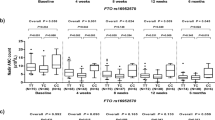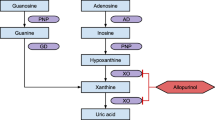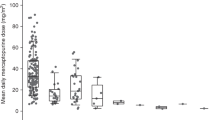Abstract
The efficacy of thiopurines, including azathioprine (AZA) and 6-mercaptopurine (6MP), has been demonstrated for the treatment of inflammatory bowel disease (IBD). The most common and serious adverse event of treatment with thiopurines altered by doctors is leukopenia. Hair loss is also a serious event that could be a critical reason for patients to decline thiopurine treatment. Thiopurine-induced severe hair loss causes cosmetic problems, and it takes a long time to recover. In a recent study, NUDT15 R139C was strongly associated with thiopurine-induced leukopenia in Korean and Caucasian populations. In this study, we performed an association study to investigate and replicate the association of R139C with adverse events of thiopurines in Japanese patients. A total of 142 Japanese patients with IBD, with histories of thiopurine treatment, were examined. NUDT15 R139C was genotyped using a custom TaqMan genotyping assay. Adverse events including leukopenia were reviewed from medical records. The 6MP dose was adjusted to AZA equivalents by multiplying with 2 as a thiopurine dose. Five patients developed severe hair loss and all of them were risk homozygous (T/T) for R139C. No early severe hair loss was observed in patients with the C/T or C/C genotype (P=3.82 × 10−16, odds ratio=212). The association of R139C with early (<8 weeks) leukopenia (white blood cells<3000 mm−3), which was previously reported in Korean patients, was replicated in our Japanese IBD cohort (P=1.92 × 10−16, odds ratio=28.4). However, we could not confirm the association with late leukopenia in the Japanese subjects. Patients with the C/T genotype discontinued treatment or required thiopurine dose reduction significantly earlier than patients with the C/C genotype (P=1.45 × 10−4); however, on manipulating the doses, there was no significant difference in the thiopurine continuation rates between the groups. In the maintenance period, the frequencies of 6MP usage were higher, and the doses of thiopurines were significantly lower in patients with the C/T genotype than in those with the C/C genotype (0.574±0.316 mg kg−1 per day vs 1.03±0.425 mg kg−1 per day, P=6.21 × 10−4). NUDT R139C was significantly associated with early severe hair loss in Japanese patients with IBD. We also verified the previously reported association of R139C with early leukopenia in a different East Asian population. It is recommended that treatment with thiopurines should be avoided for patients with the T/T genotype. Low-dose 6MP (0.2–0.3 mg kg−1 per day) could be used rather than AZA for the patients with C/T genotype to continue thiopurine treatments. However, late leukopenia and other several adverse events could not be completely predicted by R139C genotypes.
This is a preview of subscription content, access via your institution
Access options
Subscribe to this journal
Receive 6 print issues and online access
$259.00 per year
only $43.17 per issue
Buy this article
- Purchase on Springer Link
- Instant access to full article PDF
Prices may be subject to local taxes which are calculated during checkout


Similar content being viewed by others
References
Fraser AG, Orchard TR, Jewell DP . The efficacy of azathioprine for the treatment of inflammatory bowel disease: a 30 year review. Gut 2002; 50: 485–489.
Willoughby JM, Beckett J, Kumar PJ, Dawson AM . Controlled trial of azathioprine in Crohn's disease. Lancet 1971; 2: 944–947.
Rhodes J, Bainton D, Beck P, Campbell H . Controlled trial of azathioprine in Crohn's disease. Lancet 1971; 2: 1273–1276.
Jewell DP, Truelove SC . Azathioprine in ulcerative colitis: final report on controlled therapeutic trial. Br Med J 1974; 4: 627–630.
Colombel JF, Sandborn WJ, Reinisch W, Mantzaris GJ, Kornbluth A, Rachmilewitz D et al. Infliximab, azathioprine, or combination therapy for Crohn's disease. N Engl J Med 2010; 362: 1383–1395.
Gearry RB, Barclay ML, Burt MJ, Collett JA, Chapman BA . Thiopurine drug adverse effects in a population of New Zealand patients with inflammatory bowel disease. Pharmacoepidemiol Drug Saf 2004; 13: 563–567.
Chaparro M, Ordas I, Cabre E, Garcia-Sanchez V, Bastida G, Penalva M et al. Safety of thiopurine therapy in inflammatory bowel disease: long-term follow-up study of 3931 patients. Inflamm Bowel Dis 2013; 19: 1404–1410.
Heap GA, Weedon MN, Bewshea CM, Singh A, Chen M, Satchwell JB et al. HLA-DQA1-HLA-DRB1 variants confer susceptibility to pancreatitis induced by thiopurine immunosuppressants. Nat Genet 2014; 46: 1131–1134.
Bourgine J, Garat A, Allorge D, Crunelle-Thibaut A, Lo-Guidice JM, Colombel JF et al. Evidence for a functional genetic polymorphism of the Rho-GTPase Rac1. Implication in azathioprine response? Pharmacogenet Genomics 2011; 21: 313–324.
Mazor Y, Koifman E, Elkin H, Chowers Y, Krivoy N, Karban A et al. Risk factors for serious adverse effects of thiopurines in patients with Crohn's disease. Curr Drug Saf 2013; 8: 181–185.
Colombel JF, Ferrari N, Debuysere H, Marteau P, Gendre JP, Bonaz B et al. Genotypic analysis of thiopurine S-methyltransferase in patients with Crohn's disease and severe myelosuppression during azathioprine therapy. Gastroenterology 2000; 118: 1025–1030.
Takatsu N, Matsui T, Murakami Y, Ishihara H, Hisabe T, Nagahama T et al. Adverse reactions to azathioprine cannot be predicted by thiopurine S-methyltransferase genotype in Japanese patients with inflammatory bowel disease. J Gastroenterol Hepatol 2009; 24: 1258–1264.
Ban H, Andoh A, Tanaka A, Tsujikawa T, Sasaki M, Saito Y et al. Analysis of thiopurine S-methyltransferase genotypes in Japanese patients with inflammatory bowel disease. Intern Med 2008; 47: 1645–1648.
Yang SK, Hong M, Baek J, Choi H, Zhao W, Jung Y et al. A common missense variant in NUDT15 confers susceptibility to thiopurine-induced leukopenia. Nat Genet 2014; 46: 1017–1020.
Yang SK, Ye BD, Song K . ATG16L1 contributes to Crohn's disease susceptibility in Koreans: overmuch concern for ethnic difference? Gut 2014; 64: 687–688.
Yamazaki K, Onouchi Y, Takazoe M, Kubo M, Nakamura Y, Hata A . Association analysis of genetic variants in IL23R, ATG16L1 and 5p13.1 loci with Crohn's disease in Japanese patients. J Hum Genet 2007; 52: 575–583.
Hirano A, Yamazaki K, Umeno J, Ashikawa K, Aoki M, Matsumoto T et al. Association study of 71 European Crohn's disease susceptibility loci in a Japanese population. Inflamm Bowel Dis 2013; 19: 526–533.
NCI N, DHHS. National Cancer Institute, Common Terminology Criteria for Adverse Events v4. NIH publication; # 09-7473 2009.
Hibi T, Naganuma M, Kitahora T, Kinjyo F, Shimoyama T . Low-dose azathioprine is effective and safe for maintenance of remission in patients with ulcerative colitis. J Gastroenterol 2003; 38: 740–746.
Takagi Y, Setoyama D, Ito R, Kamiya H, Yamagata Y, Sekiguchi M . Human MTH3 (NUDT18) protein hydrolyzes oxidized forms of guanosine and deoxyguanosine diphosphates: comparison with MTH1 and MTH2. J Biol Chem 2012; 287: 21541–21549.
Tanaka Y, Manabe A, Nakadate H, Kondoh K, Nakamura K, Koh K et al. Methylenetetrahydrofolate reductase gene haplotypes affect toxicity during maintenance therapy for childhood acute lymphoblastic leukemia in Japanese patients. Leuk Lymphoma 2014; 55: 1126–1131.
Stocco G, Yang W, Crews KR, Thierfelder WE, Decorti G, Londero M et al. PACSIN2 polymorphism influences TPMT activity and mercaptopurine-related gastrointestinal toxicity. Hum Mol Genet 2012; 21: 4793–4804.
Roberts RL, Wallace MC, Seinen ML, Krishnaprasad K, Chew A, Lawrance I et al. PACSIN2 does not influence thiopurine-related toxicity in patients with inflammatory bowel disease. Am J Gastroenterol 2014; 109: 925–927.
Bunce M, O'Neill CM, Barnardo MC, Krausa P, Browning MJ, Morris PJ et al. Phototyping: comprehensive DNA typing for HLA-A, B, C, DRB1, DRB3, DRB4, DRB5 & DQB1 by PCR with 144 primer mixes utilizing sequence-specific primers (PCR-SSP). Tissue Antigens 1995; 46: 355–367.
Acknowledgements
We would like to thank past and present members of the IBD group for fruitful discussions and their scientific contributions.
Author information
Authors and Affiliations
Corresponding author
Ethics declarations
Competing interests
The authors declare no conflict of interest.
PowerPoint slides
Rights and permissions
About this article
Cite this article
Kakuta, Y., Naito, T., Onodera, M. et al. NUDT15 R139C causes thiopurine-induced early severe hair loss and leukopenia in Japanese patients with IBD. Pharmacogenomics J 16, 280–285 (2016). https://doi.org/10.1038/tpj.2015.43
Received:
Revised:
Accepted:
Published:
Issue Date:
DOI: https://doi.org/10.1038/tpj.2015.43
This article is cited by
-
Association of genetic variants in TPMT, ITPA, and NUDT15 with azathioprine-induced myelosuppression in southwest china patients with autoimmune hepatitis
Scientific Reports (2021)
-
The clinical efficacy of azathioprine as maintenance treatment for autoimmune pancreatitis: a systematic review and meta-analysis
Journal of Gastroenterology (2021)
-
Thiopurine pharmacogenomics and pregnancy in inflammatory bowel disease
Journal of Gastroenterology (2021)
-
Adding Thiopurine After Loss of Response to Infliximab Versus Early Combination in Treating Crohn’s Disease: A Retrospective Study
Digestive Diseases and Sciences (2021)
-
Evolving Role of Thiopurines in Inflammatory Bowel Disease in the Era of Biologics and New Small Molecules
Digestive Diseases and Sciences (2021)



